Above: families who say their loved ones were wrongly convicted rallied outside the Frank Murphy Hall in Detroit June 4; Darrell Ewing and Derrico Searcy’s brother Shawn Searcy of “Operation Liberation” organized rally.
Judge says “Brady” ruling does not apply in Ewing-Searcy case, upholding prosecutor, but she will entertain further motions, next hearing March 9
Defense atty. Blase Kearney: “The court’s denial of the ability to have an evidentiary hearing is tantamount to adopting the prosecutor’s factual representation—a finding of fact.”
 To donate to VOD, go to
To donate to VOD, go to
https://www.gofundme.com/donate-to-vod
By Diane Bukowski
January 18, 2022

Judge Darnella Williams- Claybourne
DETROIT—During a Jan. 10 pre-trial hearing on the cases of Darrell Ewing and Derrico Searcy, Wayne Co. 3rd Judicial Circuit Court Judge Darnella Williams-Claybourne denied two defense motions to dismiss and/or compel further evidence disclosure under Brady v. Maryland. That is a 1963 U.S. Supreme Court ruling which mandates that prosecutors and law enforcement officials promptly provide all exculpatory evidence, favorable to the defense.
In the motions, defense attorneys Lillian Diallo and Blasé Kearney contended that the prosecution concealed Tyree Washington’s Feb. 2017 Mirandized, videotaped confession to the 2009 murder of J.B. Watson, the crime for which Ewing and Searcy were convicted. That confession was given to the Michigan State Police and forwarded to the Detroit Police Department and the Wayne County Prosecutor.
As part of his motion, Kearney asked the Court to hold an investigative evidentiary hearing on the case, but the Judge also denied that request.

The Michigan Court of Appeals vacated the Ewing and Searcy convictions October 22, 2020, in the wake of previous rulings by multiple federal and state courts that the two Detroit men deserved a new trial, because jury members illegally engaged in gang-related research about Washington on the internet that led them to discount third-person testimony about his confession.
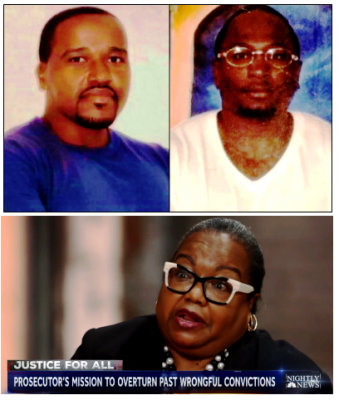
Top: Darrell Ewing (l) Derrico Saarcy (r) Bottom: Wayne County Pros. Kym Worthy
“I don’t see where Brady applies to post-conviction settings,” Judge Williams-Claybourne said, noting she had extensively researched applicable case law. “Even if Brady does apply—from what I saw—I did not see where dismissal is the remedy.”
The Judge did grant a request from Ewing’s attorney Lillian Diallo to require the prosecution to provide all copies of the Detroit Police Department’s “progress notes” on the cases by January 19, and left the way open for defense motions to reconsider her rulings. She set a date of March 9 at 1 p.m. for the next hearing.
“Unable to let the record go uncorrected, I had to mention during the hearing that there are numerous cases that hold Brady applies post-conviction,” Ewing told VOD. “That’s not to exclude the ethical duties of the prosecutor to adhere to the Michigan Rules of Professional Conduct 3.8(f).” (See box below right.)
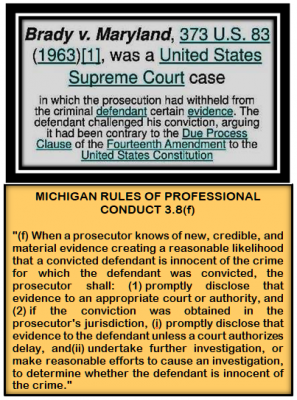 Ewing has been studying the law and taking courses for a paralegal degree since his incarceration in 2010.
Ewing has been studying the law and taking courses for a paralegal degree since his incarceration in 2010.
He continued, “God willing, on March 9th, when she gives her ruling, I hope the honorable Judge, who graciously gave us another shot, will use all of the power at her discretion to send a strong message to the Wayne County Prosecutor repudiating this travesty of justice: ‘enough is enough!'”
Ewing noted that Wayne County has the second highest number of wrongful convictions in the country, and asked, “How many more innocent men and women are they doing this to?”
Ewing and his family helped organize a rally June 4 outside of the Frank Murphy Hall attended by hundreds of others who say their loved ones have been wrongfully convicted.
During the hearing, Ewing spoke directly, citing two cases which he said showed there were rulings that Brady is applicable in similar situations. VOD’s review of one case, Tennison v. City and County of San Francisco, 2009, found it eerily similar to the circumstances of the Ewing-Searcy conviction. In 1989, J.J. Tennison and Antoine Goff were convicted for the murder of a young man which the prosecution claimed was related to gang wars. The only witnesses who testified at trial to identify the defendants were two children, girls 11 and 14 years old. Another man afterwards confessed to the murder.
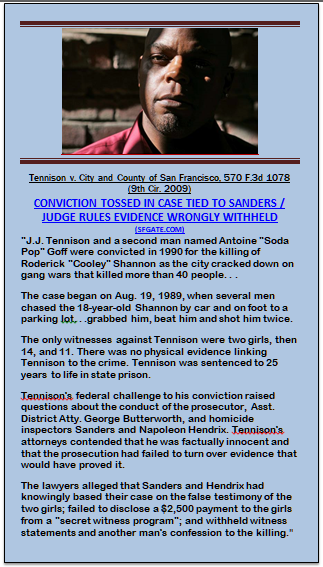 Courts thew out the convictions in proceedings after trial, citing Brady. Tennison later won a $4 million wrongful conviction settlement and was fully exonerated after the prosecutor filed for dismissal of the case.
Courts thew out the convictions in proceedings after trial, citing Brady. Tennison later won a $4 million wrongful conviction settlement and was fully exonerated after the prosecutor filed for dismissal of the case.
They said the prosecution did not report a $2500 payment to the witnesses under a “secret witness” program, and concealed the Mirandized confession of another man to the crime.
During the four-hour hearing, Judge Williams-Claybourne cited many cases that she said led her to believe that Brady does not apply in post-conviction proceedings, such as District Attorney’s Office for the 3rd Judicial District v. Osborne (U.S.2009). See link below story.
The defense countered that the ruling in Osbourne was basically that Brady was not the proper forum for the case, not that Brady was barred from all post-conviction proceedings.
She also cited a 2013 Court of Appeals opinion on the case, saying the courts already knew of Washington’s confession.
She quoted from the opinion in part, “Washington contended that the prosecutor in this matter indicated a lack of interest in having him testify at Ewing’s and Searcy’s trial ‘because they had who they wanted. Washington indicated a willingness to waive his ‘Fifth Amendment rights of self- incrimination’ and to “tak[e] full responsibility and consequences of my actions.'” See:
http://voiceofdetroit.net/wp-content/uploads/People-v.-Searcy-Ewing-COA-2013.pdf
A review of that opinion shows that most of it related to the juror misconduct, deeming it harmless error. The entire opinion was overturned later, in opinions by U.S. District Court Judge Denise Page Hood and the Sixth Circuit Court, which cited the juror misconduct and ordered an evidentiary hearing on the case.
In 2019, Wayne 3rd Circuit Judge Michael Hathaway ordered a new trial for Ewing and Searcy. His ruling was strongly upheld by the Michigan Court of Appeals.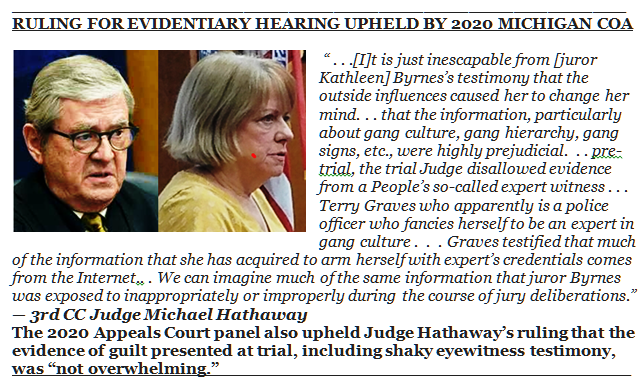
Asst. Prosecutor Kam Towns contended that dismissal of the case is not a proper remedy, and neither is an evidentiary hearing, in part because witnesses testified at the 2010 trial that they knew Washington was responsible for the murder of J.B. Watson.
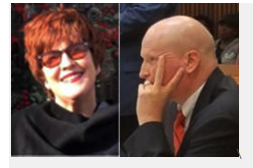
Wayne Co. AP’s Kam Towns (l), Jon Wojtala (r).
“We provided all the exculpatory information to the defense,” she said, claiming that neither she nor AP Jon Wojtala knew of the 2017 confession by Washington to the State Police until they received the criminal case file from the Detroit police officer in charge in 2020.
“It is important to understand that the entire basis for appeal had to do with jury misconduct, Towns said. “There is nothing in case law that can support an evidentiary hearing. . . The remedy is a new trial, based on the rogue actions of jurors. Not the fact that the jury listened to alleged confession of Mr. Washington and still convicted him.”
According to trial transcripts reviewed by VOD, Washington himself did NOT testify at trial, which would have allowed the jury to hear from him directly and judge his demeanor. Despite claims in the affidavit presented by his attorney to Towns that he would testify, he took the Fifth Amendment and did not. He did provide a videotaped interview to Private Investigator Scott Lewis, six months after he gave his confession to the Michigan State Police.
Searcy’s attorney Blase Kearney said regarding his motion to compel, that the legal claims in addition to Brady also include a due process violation, [a U.S. constitutional issue], and Michigan Court Rules related to discovery and professional conduct.

Attys. Blase Kearney, Neighborhood Legal Defense (l), Lillian Diallo, Legal Warriors, PLLC (r).
“I think that the court’s denial of the ability to have an evidentiary hearing is tantamount to adopting the prosecutor’s factual representation—a finding of fact. . . The Officer in Charge (OIC) is not conducting any further investigation—that’s WRONG. . .the government has decided not to act to investigate further. That adds an element of nefariousness to the OIC. There are questions that have a constitutional character to them, including factual questions. That requires an evidentiary hearing.”
Judge Williams-Claybourne cited the original Brady ruling only, but did not refer to subsequent U.S. Supreme Court decisions that expanded the scope of Brady, including Cone v. Bell (U.S. 2009): A prosecutor’s pre-trial obligations to disclose favorable or impeaching evidence “may arise more broadly under a prosecutor’s ethical or statutory obligations” than required by the Brady/Bagley post-conviction “materiality” standard of review. A “prudent prosecutor [should] err on the side of transparency, resolving doubtful questions in favor of disclosure.” (Below)
______________________________________________________
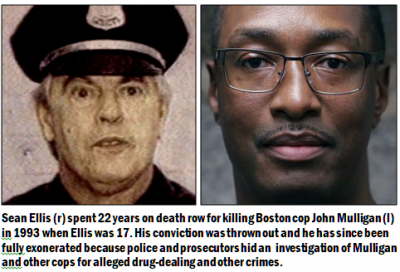
US SUPREME COURT Rulings on Brady violations
Brady v. Maryland (U.S. 1963) held that a prosecutor under the 5th and 14th Amendments has a duty to disclose favorable (exculpatory) evidence to defendants upon request, if the evidence is “material” to either guilt or punishment.
Giglio v. United States (U.S. 1972): Required reversal of conviction due to non-disclosure of immunity agreement given to prosecution witness; “evidence of any understanding or agreement as to a future prosecution would be relevant to [co-conspirator’s] credibility and the jury was entitled to know of it.” Said “impeachment” evidence on witnesses is to be treated as exculpatory evidence under Brady.
United States v. Agurs (U.S. 1976): Prosecutor has a due process duty to disclose evidence about a victim’s criminal record, with noted exceptions.
United States v. Bagley (U.S. 1985): A prosecutor’s duty to disclose material favorable evidence exists regardless of whether the defendant makes a specific request. “Favorable evidence” is “material” if there is a reasonable probability that disclosure of the evidence would have produced a different outcome at trial.
Kyles v. Whitley (U.S. 1995): Accused entitled to a new trial because the prosecution’s failed to comply with the due process obligation to disclose material evidence favorable to the accused. That evidence raised a reasonable probability that its disclosure would have produced a different result. Even if the prosecutor was not personally aware of the evidence, the State is not relieved of its duty to disclose because “the State” includes, in addition to the prosecutor, other lawyers and employees in his office and members of law enforcement.
Strickler v. Greene (U.S. 1999): A Brady violation occurs when: (1) evidence is favorable to exculpation or impeachment; (2) the evidence is either willfully or inadvertently withheld by the prosecution; and (3) the withholding of the evidence is prejudicial to the defendant.
Cone v. Bell (U.S. 2009): A prosecutor’s pre-trial obligations to disclose favorable or impeaching evidence “may arise more broadly under a prosecutor’s ethical or statutory obligations” than required by the Brady/Bagley post-conviction “materiality” standard of review. A “prudent prosecutor [should] err on the side of transparency, resolving doubtful questions in favor of disclosure.”
District Attorney’s Office for the 3rd Judicial District v. Osborne (U.S.2009): Prosecution’s duty to disclose applies only to evidence suppressed at trial, not evidence suppressed post-conviction. In this case, Plaintiff sought post-conviction release of DNA evidence through a civil lawsuit although he had not pursued the state’s established remedies for release. The USSC said Brady v. Maryland was not the proper format for Osborne to bring his complaint.
Smith v. Cain (U.S. 2012): Impeachment evidence must be disclosed when other evidence is not strong enough to support conviction.
Wearry v. Cain (U.S. 2016): The prosecution’s failure to disclose material evidence violated the death row inmate’s due process rights because the newly revealed evidence sufficed to undermine confidence in the inmate’s conviction. The only evidence directly tying the inmate to capital murder were two witnesses’ “dubious” and “suspect” testimony.
________________________________________________________
Related:
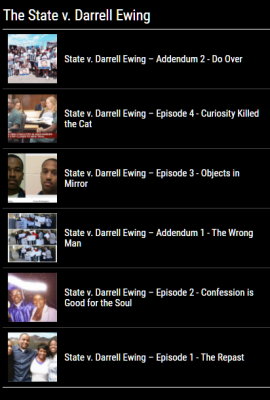 The cases of Ewing and Searcy have been featured on various national wrongful conviction websites, including a series of six episodes in which legal criminal conviction experts have reviewed the Ewing-Searcy case and found it woefully wanting in evidence to convict.
The cases of Ewing and Searcy have been featured on various national wrongful conviction websites, including a series of six episodes in which legal criminal conviction experts have reviewed the Ewing-Searcy case and found it woefully wanting in evidence to convict.
Darrell Ewing | Actual Innocent Prisoners
Rico Searcy | Actual Innocent Prisoners
Undisclosed Podcast (undisclosed-podcast.com)
https://www.unjustandunsolved.com/post/episode-8-darrell-ewing
*********************************************************************************
Related documents:
U.S. SUPREME COUT RULING BRADY V. MARYLAND: at http://voiceofdetroit.net/wp-content/uploads/Brady-v.-Maryland-__-373-U.S.-83-1963-__-Justia-US-Supreme-Court-Center.pdf
Michigan Rules of Professional Conduct: at http://voiceofdetroit.net/wp-content/uploads/Rule-3.1-3.9-Advocate-Mich.-R.-Profl.-Cond.-3.1-3.9-_-Casetext-Search-Citator.pdf
District Attorney’s Office for Third Judicial District v. Osborne: http://voiceofdetroit.net/wp-content/uploads/08-6-District-Attorneys-Office-for-Third-Judicial-Dist.-v.-Osborne-06_18_09.pdf
Tennison v. City and County of San Francisco: http://voiceofdetroit.net/wp-content/uploads/Tennison-v.-City-and-County-of-San-Francisco-570-F.3d-1078-–-CourtListener.com_.pdf
Michigan Court of Appeals ruling affirming order for new trial in Darrell Ewing, Derrico Searcy cases: http://voiceofdetroit.net/wp-content/uploads/2-Darrell-Ewing-COA-opinion-10-13-20.pdf
Transcript of Judge Michael Hathaway’s order for a new trial: http://voiceofdetroit.net/wp-content/uploads/Darrell-Ewing-Derrico-Searcy-Remmer-Hearing-Transcripts.pdf
6th Circuit ruling on Michigan AG’s appeal of District Court ruling: http://voiceofdetroit.net/wp-content/uploads/Ewing-6th-CC-2-5-19-compressed.pdf
Judge Denise Page Hood’s opinion on remand from 6th Circuit Court: http://voiceofdetroit.net/wp-content/uploads/Opinion-on-remand-Ewing_v_Woods__miedce-15-10523__0016.0.pdf
U.S. District Court Judge Denise Page Hood’s order for new trial: http://voiceofdetroit.net/wp-content/uploads/Darrell-Ewing-habeas-corpus-grant-1.pdf
**********************************************************************************
 VOD’s staff lives either on limited fixed incomes or is incarcerated. We are not paid; we publish the newspaper pro bono. Help keep us afloat by chipping in so stories on this Prison Nation and Police State, and related matters, coming! Any amount is appreciated.
VOD’s staff lives either on limited fixed incomes or is incarcerated. We are not paid; we publish the newspaper pro bono. Help keep us afloat by chipping in so stories on this Prison Nation and Police State, and related matters, coming! Any amount is appreciated.
DONATE TO VOD
https://www.gofundme.com/donate-to-vod
(Contact editor for details on other ways to send funds, at 313-825-6126 or diane_bukowski@hotmail.com.)
**********************************************************************************
Related stories:




